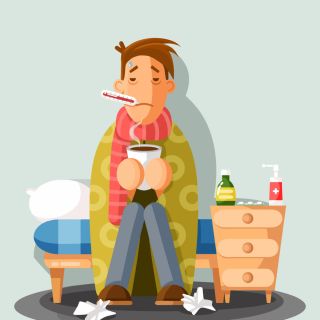Depression
How a Physical Illness Can Trigger Depression
Depression is often an unacknowledged but important companion to infection.
Posted April 21, 2023 Reviewed by Tyler Woods
Key points
- Our emotional system responds to viral illnesses.
- The immune system can affect psychological and cognitive functioning and result in depression.
- A viral infection can trigger brain cells to produce inflammatory cytokines, leading to cognitive impairment and depression.
- Emotional responses to a viral infection may be intrinsic to the process of healing.

Every aspect of our body works together in ways that inform our health. Insofar as human functioning is concerned, we can observe the brilliance of our intertwined systems when a viral infection is present. Aside from autoimmune responses, our emotional system responds to illness in ways designed to protect us. When we have caught a cold or the flu, we often feel horrible physically, but we may also feel terrible emotionally. We may attribute an emotional mood to our depletion from the physical illness, but something more significant may occur.
Although psychological states such as anxiety, depression, and stress can impact the immune system, the immune system can also affect psychological and cognitive functioning (Blank et al., 2016). Viral infections often include mood changes, cognitive deficits, headache, and a general feeling of malaise that mimic depression (Cunningham et al., 2007). Moreover, viruses or immune responses to viruses affect the brain, and these may make some people vulnerable to depression (Karimi et al., 2022)
A viral infection can trigger brain cells to produce inflammatory cytokines that impair their firing in emotional regions, leading to cognitive impairments and depressive-like behavior (Blank et al., 2016; Karimi et al., 2022). Viral sickness behavior is considered to be part of the acute phase response, and researchers have found important linkages between depression and viral diseases such as influenza, varicella-zoster virus, herpes simplex virus, and hepatitis C (Coughlin, 2012; Dantzer, 2001). Vesicular stomatitis virus—a viral disease causing sores on the mouths or feet of animals that can affect humans—can create viral sickness behaviors in humans who are affected (Machida et al., 2013). Many individuals have also experienced coronavirus-related depression that includes symptoms involving mood, sleep, anxiety, and fatigue that may contribute to a depressive disorder (Perlis et al., 2021).
Given that our psychological functioning can be affected by viral infections, these responses may be intrinsic to the healing process. Through eliciting emotions, such as those involved in depression, our body tells us that we need to rest, withdraw, or sleep. On the other hand, a viral depression may also motivate us to get out into the fresh air, distract ourselves with a good movie, or call someone who can provide a bit of comfort.
References
Blank, T., Detje, C., SpieB, A., Hagmeyer N., Brendecke, S., Wolfart, J. Staszqaki, O., et al. (2016). Brain endothelial- and epithelial-specific interferon receptor chain 1 drives virus-induced sickness behavior and cognitive impairment. Immunity, 44, 901-912. doi: https://doi.org/10.1016/j.immuni.2016.04.005
Coughlin, S. S. (2012). Anxiety and Depression: Linkages with viral diseases. Public Health Reviews, 34, 1-17.
Cunningham, C., Campion, S., Teeling, J., Felton, L., and Perry, V.H. (2007). The sickness behaviour and CNS inflammatory mediator profile induced by systemic challenge of mice with synthetic double-stranded RNA (poly I:C). Brain Behav. Immun. 21, 490–502.
Dantzer, R. (2001). Cytokine-induced sickness behavior: mechanisms and implications. Ann. N Y Acad. Sci. 933, 222–234.
Karimi, Z., Chenari, M., Rezaie, F. Karimi, S. Parhizgari, N., & Mokhtari-Azad, T. (2022). Proposed pathway linking respiratory infections with depression. Clinical Psychopharmacology and Neuroscience, 20, 199-210.
Machida, M., Ambrozewicz, M.A., Breving, K., Wellman, L.L., Yang, L., Ciavarra, R.P., and Sanford, L.D. (2013). Sleep and behavior during vesicular stomatitis virus induced encephalitis in BALB/cJ and C57BL/6J mice. Brain Behav. Immun. 35, 125–134.
Perlis, R. H., Ognyanova, K., Santillana, M. (2021). Association of acute symptoms of covid-19 and symptoms of depression in adults. JAMA Network Open, 4. doi:10.1001/jamanetworkopen.2021.3223


